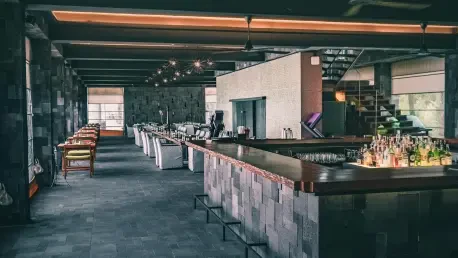The hospitality industry, marked by its diversity and dynamism, consistently harnesses innovation to meet evolving customer demands. In recent years, this sector has undergone significant changes, shaped by technological advancements, shifts in consumer preferences, and the growing importance of sustainability. These shifts are crucial for businesses aiming to remain competitive in a fiercely contested market. Within this context, the installation of Stoett Outdoors’ Kinetic Retractable Glass Railing and Windbreak System at Carve American Grille stands out as an example of how innovation can elevate the dining experience by seamlessly blending elegant design with functional utility.
Industry Overview
The hospitality industry, encompassing a myriad of services such as restaurants, hotels, and travel, remains a cornerstone of global economies. Currently, this sector experiences rapid growth, driven by increasing consumer spending and the rebound of international travel. Advanced technologies, like automation and data analytics, play pivotal roles in enhancing operational efficiency and customer engagement. Meanwhile, major players are focusing on eco-friendly practices to align with both regulatory expectations and consumer preferences. Regulations continue to evolve, impacting areas such as health and safety standards, data protection, and sustainability initiatives.
Market Trends and Projections
Key Trends in the Hospitality Industry
The hospitality realm is witnessing a transformation underpinned by digital innovations and changing consumer expectations. Current trends include the adoption of smart technologies to enhance guest experiences, personalized services facilitated by data analytics, and a growing emphasis on sustainability. As consumer focus shifts toward environmentally conscious leisure experiences, businesses are investing in green technologies and sustainable designs to meet these demands. The integration of virtual reality for immersive experiences and AI for personalized interactions stands out as significant opportunities for growth.
Market Projections and Performance
Forecasts indicate robust growth for the hospitality industry, with revenue expected to expand substantially in the coming years. Populations with rising disposable incomes and global connectivity contribute significantly to this optimism. Analysts predict that technological integration and the focus on sustainability will drive market momentum. Performance indicators reveal a positive trajectory, although businesses must adapt to the shifting landscape to capitalize on new opportunities effectively.
Challenges and Solutions
Despite its vibrant growth, the hospitality industry encounters several hurdles, such as intense competition and fluctuating consumer patterns. Technological challenges include the need for continuous upgrades to maintain competitiveness and secure guest information. Regulatory complexities add another layer of difficulty, as businesses must navigate evolving compliance requirements. Strategies adopted to overcome these challenges are varied and involve creating flexible business models, forging strategic partnerships, and leveraging technological advancements to improve service delivery.
Regulatory Landscape
The regulatory environment in the hospitality sector is intricate, shaped by numerous laws and standards designed to ensure safety, privacy, and fair practice. Notable regulations include those governing health and safety, especially post-pandemic guidelines, and enhanced data protection measures to safeguard consumer information. Compliance with these regulations necessitates continual adaptation by industry players, which can lead to operational reforms.
Future Prospects
The trajectory of the hospitality industry leans toward increased reliance on innovative technologies and sustainable practices. Emerging technologies, such as blockchain and artificial intelligence, are poised to further revolutionize service delivery and operations. Consumer preferences increasingly favor personalized and immersive experiences, prompting businesses to explore cutting-edge solutions to maintain engagement. Future growth areas include sustainable tourism and boutique accommodations that cater to niche markets.
Conclusion and Recommendations
This industry’s path forward hinges on embracing innovation and adaptability. The Stoett system at Carve American Grille exemplifies how the careful integration of new technologies can transform customer experiences by merging functionality with aesthetics. Businesses are encouraged to prioritize sustainable practices and stay attuned to regulatory changes to maximize their competitive advantage. As industry dynamics continue to evolve, adapting growth strategies centered around innovation and consumer-centric solutions will be paramount.









